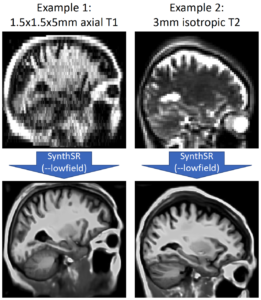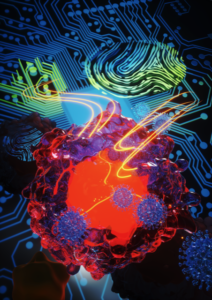PIs: Dr. Matthew Rosen and Dr. Juan Iglesias Gonzalez
Portable MR imaging of stroke
The goal is to develop machine learning techniques to improve image quality and extract morphometric measures from low-resolution, low-SNR brain MR images acquired with a portable scanner.

PIs: Dr. Bin Deng, Dr. Jayashree Kalpathy-Cramer, Dr. Stefan Carp and Dr. Christopher Bridge
DeepTOBIDx – Deep learning-enabled real-time diagnostic tomographic optical breast imaging

PI: Dr. Christian Farrar
Deep Learning Aided Magnetic Resonance Fingerprinting of Tumor Apoptosis

PI: Dr. Christian Farrar and Dr. Matthew Rosen
An AI-Based Framework for Automated Discovery of Rapid Magnetic Resonance Fingerprinting Acquisition Protocols for Molecular Imaging

PI: Dr. Kristina Simonyan
DystoniaNet: A Deep Learning Platform for Dystonia Diagnosis and Treatment
Publication:
Yao D, O’Flynn LC, Simonyan K. DystoniaBoTXNet: Novel Neural Network Biomarker of Botulinum Toxin Efficacy in Isolated Dystonia. Ann Neurol. 2023 Mar;93(3):460-471. doi: 10.1002/ana.26558. Epub 2022 Dec 14. PMID: 36440757.

PI: Dr. Kristina Simonyan
Brain Computer Interfaces: Decision Making and Dystonia Treatment
Publications:
Valeriani D, O’Flynn LC, Worthley A, Sichani AH, Simonyan K. Multimodal collaborative brain-computer interfaces aid human-machine team decision-making in a pandemic scenario. J Neural Eng. 2022 Oct 17;19(5). doi: 10.1088/1741-2552/ac96a5. PMID: 36179659.
Simonyan K, Ehrlich SK, Andersen R, Brumberg J, Guenther F, Hallett M, Howard MA, Millán JDR, Reilly RB, Schultz T, Valeriani D. Brain-Computer Interfaces for Treatment of Focal Dystonia. Mov Disord. 2022 Sep;37(9):1798-1802. doi: 10.1002/mds.29178. Epub 2022 Aug 10. PMID: 35947366; PMCID: PMC9474652.



